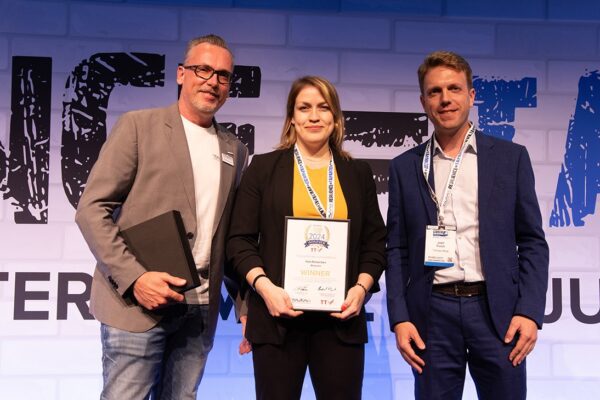
A Look at Cargo Crimes Reported to the TAPA EMEA Intelligence System (TIS) in the First Nine Months of 2023
New data for the opening three-quarters of 2023 suggests cargo thieves are increasingly getting the upper hand over often complacent supply chain stakeholders. The battle is not lost … but crime is spreading, losses are soaring, risks are escalating, and the majority of logistics providers are still ignoring the solutions readily available…

The term ‘supply chain resilience’ is being heard more and more in businesses across the Europe, Middle East, and Africa region, but, like all hot topics, its true meaning can sometimes be lost in translation.
For anyone in any doubt of what it should mean, TAPA EMEA’s President & CEO, Thorsten Neumann, opened his nine-month cargo crime intelligence presentation at the Association’s RESILIENCE@RISK Virtual Conference by quoting Professor Daniel Ekwall, a speaker at TAPA EMEA’s last regional conference in Copenhagen.
Professor Ekwall, who also has the distinction of being a former corporate risk manager for security at DB Schenker, summed it up perfectly in just 11 words…
The goal is to achieve ‘business as usual’ at all times.
In the first nine months of 2023, however, business as usual was severely disrupted for thousands of supply chains across the EMEA region, impacting manufacturers, logistics service providers, consumers, and all other stakeholders, either directly or indirectly, due to the substantial rise in cargo crime.
Put simply, 2023 has been a devastating year so far – and an extremely costly one – for supply chains in terms of criminal attacks – and this is a statement which must always be qualified by the additional fact that it is only based on cargo threats reported to the Association. Most incidents, undoubtedly, still go unrecorded in such a way which would clearly identify them as a supply chain theft.
TAPA EMEA’s big data slide for the period from 1 January-30 September 2023, pulled no punches.
In the space of 273 days, the Association’s cargo crime database was notified of 49,366 criminal attacks on supply chains in 67 countries across EMEA. While only 4.4% of these crimes gave a loss value, this tiny percentage produced a staggering total of €552,199,741.
48 of these incidents recorded losses of more than €1 million, and a further 202 crimes involved thefts of products worth €100,000 or more. Very often crimes in this latter category produced substantial six-figure losses.
Based on these numbers, the average daily loss over nine months stood at €1,828,475.
Thorsten Neumann highlighted three extreme contributors to the data presented for the first three-quarters of the year. These included €300 million of losses recorded in just two crimes; one involving the hijacking of miscellaneous goods in Belgium, and the other a case of fraud detected within a metal supply chain by a global organisation based in Germany.

The other big distinguishing factor was the more than 40,000 incidents added to the database from the South African Police Service (SAPS). While TAPA EMEA’s crime data for South Africa has previously focused on the country’s significant rate of truck hijackings and cash-in-transit robberies, the latest nine-month data also takes into account the police incident categories of common robbery, robbery at non-residential premises, burglaries at non-residential premises, and stock theft. Not surprisingly, therefore, this new data positioned South Africa firmly at the top of the list of countries for the most recorded incidents in the nine months to 30 September 2023. The rest of the top 10 included two countries with four-figure cargo crime rates, notably the United Kingdom with 3,397 recorded incidents, and Germany with 1,770.
The other countries in the ‘recorded cargo crime top 10’ were:
- France – 814 reported incidents in 9 months
- Sweden – 682
- Italy – 588
- Spain – 481
- Poland – 115
- The Netherlands – 90
- Russia – 81

The statistics, however, came with a clear warning from TAPA EMEA’s President. A country with a high rate of recorded cargo crime might actually be safer to operate in than another country with only a handful of reported thefts from supply chains registered in the TAPA EMEA Intelligence System (TIS). Higher rates of national crime in the Association’s database, he added, are usually the outcome of better reporting and intelligence sharing, whereas low levels of reporting in countries leave security professionals oblivious to the supply chain risks which almost certainly exist to a similar high level.
He emphasised that supply chain security professionals can only manage risks and prevent losses when they know what those threats are most likely to be.
Even after removing the three major contributors to this reporting period, loss values attached to crimes over these nine months were still alarmingly high, totalling €252,199,741. Broken down, this figure included:
- €115,953 – the average loss for incidents with a value over 9 months
- €903,976 – the average for crimes involving losses of goods of €100K or more
- €835,098 – the average loss from supply chains in EMEA for every 24 hours in the first nine months of 2023
Germany recorded the highest number of major losses, both in terms of the number of incidents and value, although the latter was massively influenced by the major metal loss referenced earlier. Major crimes are classified by TAPA EMEA as incidents involving losses of products worth €100,000 or more.
In Q1, Q2, and Q3 2023, the 48 major attacks on supply chains in Germany produced an overall loss of more than €127,000,000.
Five other countries also recorded double-digit incident rates:
- France – 40 incidents with a combined loss of €52,861,879
- Italy – 40 and €16,982,221
- South Africa – 37 and €16,862,121
- Spain – 23 and €19,034,961
- United Kingdom – 21 and €76,021,154
Whilst generally involving relatively low financial losses per incident, one of the big crime trends of 2023 to date concerns a significant rise in the number of fuel thefts, driven by higher fuel costs and cost of living pressures, particularly in Europe, over these nine months. TAPA EMEA received reports of 1,526 incidents across 27 countries, with over 87% of these crimes registered in just three of these countries; the UK, Germany, and France. The total loss recorded for the 150 fuel thefts reported to TIS stating a value was close to £375,000.
Whilst fuel thefts may seem relatively insignificant in terms of value compared to other product losses, these types of crimes can and do have a significant impact on supply chain security and resilience. Trucks are often left stationary and vulnerable to other forms of cargo crime if their fuel tanks are emptied, while damage caused to fuel caps and fuel tanks during these attacks not only increases the cost of recovery but can often remove the vehicle from operation while repairs are undertaken, losing much-needed capacity.
Another noticeable trend seen this year is the reduction in recorded crimes linked to unsecured parking locations. This was highlighted in these figures for the top five countries by overall incidents numbers in YTD2023:
- South Africa – 0.03% of crimes were reported in unsecured or unclassified parking locations
- United Kingdom – 6.1%
- Germany – 25.8%
- France – 17.4%
- Sweden – 3.6%

The overall cargo crime outlook, however, remains bleak in these unprecedented and unpredictable times, which, history suggests, will produce more risks.
Supply chains face greater pressures today and these risks are many and varied, said Thorsten Neumann. The current wars raging in Ukraine and in the Middle East are creating significant geopolitical uncertainty, but he also highlighted many other factors impacting supply chain resilience, including:
- staff shortages across the entire supply chain
- driver shortages specifically
- disruptions to transport capacity
- port congestion
- high fuel prices
- higher shipping costs
- cyberattacks
- migrant intrusion
- cost of living pressures
- activism
- extreme weather
- … and the previously mentioned rise in fuel thefts.

And the list just goes on…
But there can be no place for victim mentality. Industry, he added, must take its share of the blame, because in the fast-paced, dynamic and, sometimes, low margin world of supply chain logistics, many current factors ‘open the door’ to cargo crime, such as:
- constant commercial pressures
- poor employee training
- lack of security awareness
- lower security budgets
- staff shortages
- poor employee and candidate vetting
- outsourcing
- lack of due diligence
- poor route planning
- insufficient secure parking
- a reluctance to pay for secure parking
These factors, he said, coupled with low penalties for offenders when they are caught and prosecuted, and the perception that cargo crime is a low priority and victimless crime by some law enforcement agencies, is accelerating the breeding ground for cargo thefts.
From a cargo theft prevention perspective, there are constant questions for supply chain security professionals to have to answer… including:
- What security systems and processes are in place at their own and supplier facilities?
- What are the weakest links in their cybersecurity chains?
- Are their security standards fit-for-purpose and measurable?
- Do the facilities they’re using have independent security accreditation?
- Have they carried out sufficient due diligence on suppliers?
- Have they vetted personnel correctly?
- Have they prevented outsourcing by transport & logistics suppliers or put in place a clear, managed process for this?
- Have they carried out a risk assessment on chosen supply chain routes?
- Do they know where criminals are most active on these routes?
- Are they using secure truck parking locations?
- Are their front-line personnel aware of the M.O.’s used by cargo thieves?
For those willing to look, however, many solutions designed to protect supply chains and reduce the risk of cargo crime are readily available, although often overlooked.
He called on more logistics service providers to adopt TAPA’s supply chain security standards, which have been designed by the industry to provide minimum security levels to manage risks and prevent losses. He also encouraged manufacturers to promote the TAPA Standards across their supplier bases or to introduce TAPA certification as a contractual requirement.
While the growth of TAPA’s Facility Security Requirements (FSR) and Trucking Security Requirements (TSR) remain positive year-over-year, with 17% and 20% increases in certifications respectively, the number of companies that can boast of being TAPA certified is still only a tiny percentage of all the service providers working in the transport and logistics market in EMEA.
For the majority of companies, raising the bar in terms of cargo security often only becomes a requirement and a sudden reality when they suffer a significant cargo crime and experience the impact this has on their businesses and customer relationships.
Returning to the overriding theme of TAPA EMEA’s conferences, he said it is beyond any doubt that supply chain resilience is more at risk today than at any time in the Association’s 23-year history in the EMEA region. In particular, he referenced:
- in an increasingly technology-connected world, all goods moving in supply chains are at risk
- Organised Crime Groups (OCGs) increasingly see supply chains as easy and lucrative targets
- OCGs are also becoming far smarter and increasingly sophisticated in the way they target supply chains
- the cost-of-living crisis in many European countries may also be behind the rise in lower value losses, and, perhaps more worrying, could become a longer term breeding ground for a new generation of cargo thieves
He advised RESILIENCE@RISK conference delegates not to wait until they become a victim of a supply chain attack before they become proactive in the fight against cargo crime. Industry standards, training, and cargo crime intelligence are available right now to improve supply chain resilience.
In closing, he urged everyone to report all cargo crime information and intelligence they have access to or which they see reported by other credible sources.
In the fight against cargo crime, he said, companies are stronger when they work together, and in combination with their pre-eminent industry Association.


















